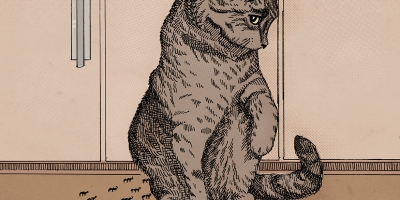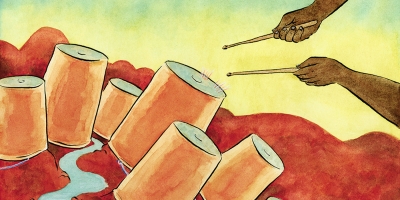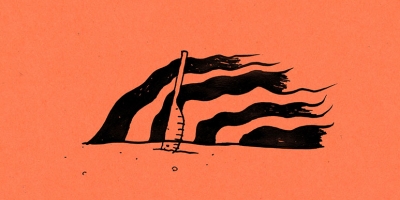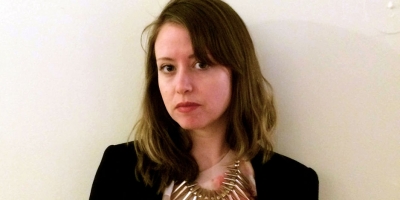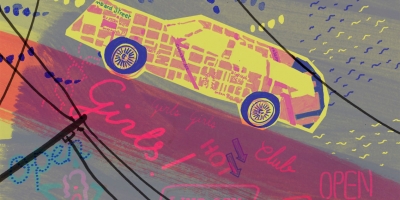Fiction
Pressed Pulp
by Devon Price

I worked in a paper mill for twenty years before my dad kicked it and left me enough money to go back to school.
“You’re too old for this life, Emilio,” he said, holding my hand sandwiched between both of his, letting them vibrate weakly around me. “Your knee, your shoulder. What’s next, your back?” He shook his head sadly. “You’ll come all apart into little hunks of meat. And nobody has any use for that, not coming from an old man like you.”
He smiled and wheezed as he said it, then withdrew his weary hands to wipe smeary tears from off his face. My father was eighty-seven years old the year he died, and I had just turned fifty. Looking at his withered, soft body, the colonies of liver spots, the growing lacunas of bruises and scabs expanding on his face and chest, I felt like the small, weak, diminished one. I was like an orphaned, feral child, and as he withered away, it was like the years were dropping from my body, making me need him more than ever. When his breathing got throaty and wet and rumbled like my ten-year-old laptop, I wanted to throw back the quilt Mom had made for him, drop my head to his thin chest, and crawl in beside his failing body. Instead, I went to get doughnuts from the Honey Hut down the street, eased into a nauseatingly red plastic booth as I waited for the order, and cried, and cried, and cried.
My father did what he could for us for over sixty years. My mother had been a nurse, for a while, and he was a handyman, his hands nimble but strong. He worked for people who couldn’t afford an electrician, a mechanic, or a certified HVAC guy. That meant a lot of days bent over rusted church vans, crawling into the vents of shelters and children’s homes, and walking on the roofs of poor people’s houses, a fraying, faded tool belt swinging on his hips. He worked nights, weekends, and holidays, and never charged extra, because that was his competitive advantage. If a potential client asked him why they ought to hire him when he had no formal training, he would give a smile of coffee-yellowed teeth and tell them, “My ignorance is your asset.”
He was a good fixer of things, a hardworking man, a penny pincher, and something of a failure. My mother quit her nursing job when I was born, and stayed quit as we were joined by twin infant girls and another baby boy. One of my sisters had a bad back that required years of surgery and months of recovery, sitting in bed all closed up inside a plaster cast.
My little brother had a speech impediment, and the school forced hours of verbal-therapy bills upon us, which we could not pay. My other sister was bright and talented, an honors student with a clear, canary-like voice, and so my parents paid to send her to a school befitting of her excellence. That left me.
I was the reasonably invisible one, the child that was golden in his lack of demands. For years, I helped wash, change, teach, and raise my sisters and brother, never complaining or asking to be let out to play. I led them in games—cards, spelling competitions, spies and counter-revolutionaries, sometimes even imaginary beauty pageants (in which my sisters always tied for first). I slept nights with them in a tent in the backyard, burning cheap marshmallows on a candle Mom didn’t like the smell of. I missed dates and track practices and meets to care for them.
I did not ask for the best in clothing or books. When I got out of school, I spent an hour or two trawling the library for thick, worthy tomes for myself, and fresh-looking, brightly colored picture books for my siblings. I learned to make spaghetti sauce from scratch, how to sew, how to staple a wound shut, and how to make a furious infant sleep. When I turned sixteen, I got a job mowing lawns and edging sidewalks. All my pay went into a glass mug on the kitchen counter beside the phone. It bought my siblings lunches and ballet outfits and pinewood-derby cars until I left the house.
Of course there was no money for college, not for me. I paid four hundred fifty dollars cash for a little green sedan and drove west for a while. I smoked a lot of weed and rolled around with people in hotel beds. In California, I took a job as a masked character. Goofy. My experience with children and with shouldering burdens with a smile and a spring in my heels enabled me to wear Goofy’s massive, airtight head for hours at a time on humid eighty-nine-degree days, kept me dancing in the thick furry costume, and left me still ready and willing to hug.
I called my dad up and told him I was a performer. Maybe I even used the word “actor.” He cracked a beer open on the other end of the line and said, “Son, you’re a monkey on a leash. I know you can do better than that.”
And so I hitchhiked up to the Pacific Northwest, started wearing flannel, grew some stubble, got an earring (which Disney prohibited), and found a job in lumber. All the other men were thick-necked with dark empty eyes. And I’m not talking about eye color; some of them were the fairest, bluest-eyed Nordic Viking men you’ve ever seen. But to look at them straight on was to see all the lights had been turned out. Cuts ravaged their arms and necks, and their voices were gristly.
I took up smoking to sound more like them, and to have an excuse to walk away from the saws. The noise was too much. Three baby siblings who did nothing but shriek and sob the first two decades of their lives, and it was the buzzing of a saw that drove me batty.
I got a one-bedroom apartment north of Seattle, with no windows and particle-board walls and doors. My dad came to visit after dropping my sisters off at school. He stood on the shag in wet rain boots and drank the black coffee I’d brewed for him, lost in contemplation.
“Are you proud to be living here?” he asked. “You take a woman back here and she doesn’t give you any trouble about it?”
I didn’t have the heart to correct my dad and tell him I was bringing back men, mostly, and that nobody had a bad thing to say about the place, actually. It was warm and got plenty dark at night—easy to sleep in. Quiet, quieter than anyplace I’d slept at before. I just shrugged and offered to drive him to the mill.
He was impressed. He got along with the men better than I ever had. We came back home and Dad kicked his shoes off, slid on a pair of fuzzy slippers, and declared I was doing all right. Not what he had imagined for me, but damn impressive. That was when I knew I had to move.
No one had ever noticed before, but I was secretly very smart. During all those years of babysitting, I had been reading, writing poetry, thinking very hard about my values and what living in the world meant. I also knew a lot about managing gaggles of out-of-control, half-crazed little beasts. So once I was transferred from lumber to paper, I ascended the ranks of management.
I knew how to motivate people, and I could capture their attention, lasso it, and tie it to the proper task. Employee interactions fascinated me. Bringing a sour-faced, lazy kid to the mill and transforming him slowly into a straight-backed area lead with the highest production numbers in history gave me little shivers of glee.
Soon I was in charge of all the feet on the ground at my particular mill. They offered me a chance in corporate, but I didn’t want it. I enjoyed the smells of the chemical baths, the short strips of wood, the frothing sound of the pulp as it sloshed down the conveyors and was pressed into place, the constant deafening hum of the fans as they dried the paper. I liked the men there, too.
One day, though, two new employees got into a scuffle over something homophobic one or the other of them had said or done. It was unclear. I couldn’t hear their yelling over the sounds of the mill, so when I found them, they were already on the floor, tangled up and beating each other with bare fists, their steel-toed feet scratching across the cement floor, seeking stability and purchase. I pulled them from each other and got a big plum of a shiner below my left eye. I fired them.
I called my dad up and told him, to see what he’d think about my choice. “Some men just have no sense,” was all he said, when the story was finished. Then he told me he was glad he always worked alone, with no coworker’s bullshit to swallow and no bosses to give him flack.
I started reading books on leadership and organizational behavior. The library in the mill town was tiny, crammed floor to ceiling with smelly paperbacks by Dan Brown, Stephen King, Dean Koontz, and V. C. Andrews. It took three weeks for any special orders to come in. But I took them, thick crisp textbooks from business schools and psychology departments, training manuals from Fortune 500 companies, and memoirs from various entrepreneurs in finance, automotive, medicine, and tech.
I stuffed all the books in a cheap army-surplus rucksack and took it home with me for Christmas. “You’re looking to be a lifer, there, huh?” my dad said.
“I just find it all very interesting,” I explained. And I did.
After a decade, the paper mill paid for me to take a few credits at Washington State’s regional campus in Spokane. Business and management courses, mostly, and one on accounting. I drove out there nights, sleeping at a boyfriend’s apartment in between weekend classes. I barely saw my sad little studio. I was tired all the time, and my head swam with new knowledge that hadn’t yet congealed into a meaningful form.
After the first semester, I slipped in classes on the psychology of group behavior, the sociology of industrial capitalism, human motivation, and the like. A tower of books grew in my kitchen and my boyfriend’s living room. I organized the mill workers into several independent productivity teams, taught them to lead themselves. There were snags, but it was a big success within three years. Then the mill told me I’d had enough courses, learned all I needed, and they cut me off before I could finish the degree.
My dad asked me where all of this was headed. When was I getting an office, a real house? Didn’t I want a proper family? I realized then that I was the boss, the one sending men home to drink and waste their paychecks out in the boonies. I was the kind of man my dad was happy to have avoided. It put a sour, anxious feeling in my throat that didn’t go away all winter. At Christmas, I just sighed and looked back into my books, now-useless texts for a degree I wasn’t going to earn. Whenever my gaze lifted off the pages, I caught him watching me, engrossed like I was a radiator making a funny sound that he couldn’t figure out how to fix.
And then he died. It was years later, actually, but not much had changed. The mill couldn’t get any better; there was no place for me to go that was any higher. I’d been shipped off periodically to train new managers at other locations, to build other leadership teams, but most days were the same. The boyfriend had moved in with me, but then we fought a lot, each fight piled on top of all the others until all the conflict towered over us. His solution was to give me a ring. That shut me up for a little while, but it didn’t really change anything, and then next time a real blow-up happened, he moved out. I was trying to convince my postal worker to get a drink with me someplace other than the local old-man bar. I was making slightly more money than before, but everything was more expensive, too. My dad was dying, and I was fifty, and I didn’t know where any of it was headed except for straight on, just the way it was, and for forever.
“Emilio,” he croaked. “It’s your time now.”
“What do you mean?” I asked him.
He smiled and whitish tears clouded his gaze up. “I mean it’s time for you to be selfish.”
I think he knew then. I don’t know that he could have handled it, and I didn’t have a boyfriend or a fiancé then, anyway. But I think he was glad to be dying, in a way, because it would free me up. My mother took me to a private room at the funeral home and, dabbing her face, told me the whole life-insurance policy was for me, that Dad wanted it to pay for my studies.
The words caused my dreams to drop, like a gigantic egg I’d been waiting to lay for years, and opened it up so I could see the bright yellow sun inside it. I did want to study more. Leadership, motivation, diversity and group functioning, employee training stratagems. I wanted to know more, still, and I wanted to put my lay theories to the test, and write them down where somebody else would see them.
I got in at UC Irvine. The postal worker visited me at my dorm a few times, then grew bored and started dating a butcher back in Washington. I barely noticed. School became my fiancé, and instead of a new last name, it promised me three new letters: PhD. My advisers and teachers were my fathers and mothers; my cohort became my brothers, sisters, all of us twins, all of us free to be selfish.
I was the oldest person there by a decade. I sat in front rows and wrote notes by hand as they all typed. I wrote my papers on my ancient laptop, working over each word with the same care and fear I’d given the buzz saws, ‘til my eyes got blurry and my fingers locked up. My shoulder and knee, both injured in the mill, croaked and stung with pain when I sat for more than four hours straight, which happened every day. I made out with a twenty-six-year-old communications TA in the stairwell of the library during finals.
“You’re such a silver fox,” he said shyly. He was blond with a stately big nose, eyes green like the trees I used to slice up.
Would my dad have been proud that I graduated in record time? Would he have slapped me on the back and called me doctor at every opportunity, like my sisters did? Or would he have adjusted his weight loudly in his seat, stabbed a strip of chicken into his mouth, and chewed over his words, saying “Well, you can call yourself a doctor, but if I had a knife in my chest it’d still be your mother I’d ask for help”? Would he, like my little brother, simply stare at the TV and wonder aloud how much more money I was gonna make now?
Being a PhD meant taking a major pay cut, actually. I couldn’t go back to the mill; I was overqualified, a financial liability. They looked at my five years of graduate school like an extended mental health break, or a paternity leave that hadn’t resulted in a child.
So I stayed in Irvine and taught Intro Psych to college freshmen with undernourished faces and expensive phones. A few girls came to office hours twisting their hair and giggling at me. The TA was right, I guess. I was a silver fox.
“You remind them of their dads,” he explained one night. His head was on my chest and he was rifling through my chest hair, seeking grays.
“I’m not anyone’s father,” I complained. And I knew I never would be.
A painful sting ignited on my left pectoral, right beside my nipple.
“Found one,” the TA said.
We moved in together. I started teaching at a community college to help smooth things out, financially. But my boyfriend the TA was taking too long to graduate, and his dissertation was three hundred pages long, and he set up a workstation on the kitchen table and sat there all day, not moving.
At least I never committed the cliché of screwing a student. None of the young guys looked at me like that. It was always freshman and sophomore girls who brought me coffee, sat in my classes with rapt attention in department-store V-necks, smiling, nodding, wanting to suck approval out of me however they could. I could imagine my dad sitting behind me as I lectured, clicking his tongue on the roof of his mouth. I couldn’t tell if the judgmental sounds were from disdain or proud amusement. I hoped he was really there behind me. I hoped he saw how diligently I strove to keep boundaries.
But there was a visiting mathematics prof. He was from the United Arab Emirates and was living with his sister and her husband. We met at a faculty happy hour. I was stuffing my face with the good cheese, the kind I cannot buy for myself, when he came up and said, “Congratulations on graduating.”
I looked at him, perplexed. “How did you know?”
“Because,” he said, handing me a plastic cup of wine, “you’re wolfing down that terrible brie like someone who just started making student-loan payments.”
It had to be a secret. His sister was religious, and my boyfriend was still the monogamous type, even if his primary partner had become his MacBook Air. A few weeks later, after attending a panel on facilitating brainstorming, I kissed the math prof beside the fountain, under the streetlamp, with all the undergraduates milling around us.
And he said, “Let’s go somewhere.”
And I said, “Where?”
Our teeth clicked against each other. “Don’t you have an office?” he mumbled into me.
My office was a shared space on the ninth floor, formerly a study area for engineering students. But the engineers had gotten a new complex with solar panels and water fountains that recycled drainage from the roof, so the business-psychology instructors like me were all gifted a tiny, windowless, three-desk room to share, locked behind a particle-board door.
We stood in the dark hallway at twelve AM, ignoring the woman buffing the floors. Instinctively, he and I stood tall and held our messenger bags high, trying to make it look like we were there to compile some last-minute data or settle a grading emergency. He kept a few feet away from me and jangled his watch while I dug around for my keys.
The door to my shared “office” jammed. I tried turning the key left and then right, and leaned into it, laughing to myself. I looked at the math prof and just chuckled with an embarrassing wheeze underneath. The key turned and the latch clicked inside the lock, but there was no turning the knob, and no give in the door.
“Something wrong?” the math prof asked.
“Nah, it’s just sticking…” My dad would have known how to fix it. He’d have a small tool kit in the pocket of his jeans, would go about taking the door from the frame and inspecting it right then and there. Instead, I just leaned and pushed against the door and squeezed the knob with a sweaty palm until my hand slipped off.
“Piece-of-shit place,” I said, taking the math prof’s face in my hands and moving in to kiss him. His tongue was slower this time, and his eyes stayed open, distracted, scanning down the hall for the janitor. “I’m sorry,” I told him.
He said it was okay in the tired, disappointed manner of a child receiving socks on his birthday but putting a brave face on it. If we didn’t seal the deal soon, he’d give up on me, I was certain. The math prof was a bit younger than I was, but age-appropriate, a proper man. Not like my boyfriend, who claimed that undergraduates admired me for my fatherly charm, when really he was speaking about himself. This thing would not be tenable, I thought, but it would be good and right. A true collaboration, with a sensible, grown man, the kind of professional I could’ve been had I gone to school earlier. I thought it might fill me up like helium, having his approval, no matter how fleeting it was. I just wanted a properly grown, mature man to really like and respect me. I wanted to be on even footing with him. I wanted him to think I was worthy of his time.
So I followed the janitor to the broom closet and asked her for tools. She stared at me unblinking as she reached inside, retrieved a slim metal toolbox, and handed it to me. I was wearing a suit. The math prof stood behind me in a tweed coat and scarf, excessive in the balmy Irvine weather. I thanked her sheepishly and went back to the door.
My father once told me that these cheap particle-board doors couldn’t be fixed. One use only, he said. If you tried to force them open they disintegrated into a pile of sawdust. I stood on a chair from the hallway and opened up the joints at the frame. My companion watched, grew bored of my incompetence, strolled down to the bathroom.
At last the door came open with a loud crack. The math prof materialized as I stepped off the chair, and we both withdrew at the sound of a gasp from inside. There was shuffling, fabric rustling, and the dull smack of feet on the dirty office carpet. I looked at my companion, back at the door, and then grasped the wood with both hands, threw it back and open.
The door was still locked and there was a chair on the other side, forcing the knob shut. Pulling the door back caused it to splinter and split immediately, a loud tearing sound that alerted the janitor. She came up, appraised the mess with a look of potent disdain, and then took a deep breath as she noticed the man in pajamas before us.
His name was Willard. He came in to the program a year after me, straight out of undergraduate at Missouri. A Midwestern boy, he had broad shoulders, dark black cow eyes, and a pretty, full mouth. In the classes I’d shared with him, Willard was almost silent, but studious. His reports always got high grades, but his presentations were stutter-laden, incomprehensible, terrible. I invited him out for drinks a few times, but he always demurred on the grounds of poverty. I assumed he was afraid that I’d hit on him and gave him a wide berth.
He was wearing flannel pajamas and soiled white socks. His tightly curled hair was mussed into an asymmetrical shape that hung half in his face and made him look doll-like. Behind him was an inflated twin-sized air mattress, with sheets and a comforter.
The math prof saw that this was his chance to leave, and he did, not saying a word to me. He knew there’d be phone calls, security officers, department meetings, maybe cops. I didn’t watch him go. I barely heard his dress shoes squeaking on the buffed tile as he snuck down the hall and away.
Willard’s funding had fallen through, and he had no time to pick up a job. I learned later that he’d been eating Cheez Wiz and instant cocoa from the faculty break room, and showering in the evenings at the student fitness center. Always, he waited ‘til eleven PM to unroll the mattress from its hiding place in the file cabinet and pump it up. Then he would make the bed, plug his phone in, and set an alarm for five AM. Then a breakfast of coffee with tons of creamer in the main office. When we found him, he was about to tuck into bed for the night, with nothing but his phone and the few old textbooks that were lying around to entertain him.
The janitor reached for her walkie-talkie, but I touched her on the back of the hand and said, “No, let’s not do this.” A big, dark young man like Willard, sweaty from sleep, looking odd in his pajamas, terrified of what would happen next? I said, “Let’s not get campus security involved in this.” My faculty ID calmed her down and convinced her to shuffle off.
Willard followed me outside, the air mattress rolled up and clutched to his chest.
“What do I do now?” he asked. “I can’t go home to my family like this.”
“No,” I said. “Don’t go home. Stay here. You’ll get funding next year, maybe. I’ll write you a letter.”
He should have been blubbering with gratitude at that point, I thought, but he wasn’t. He ran his hands along the air mattress’s plastic cover and wondered aloud, “Maybe I can go to the library.”
So I took him home. My boyfriend was furious. He nearly failed his defense, he lost so much sleep and study time over it. Willard wasn’t a great guest, either. He left food wrappers everywhere, couldn’t clean a glass right, provided no conversation. He stayed for a month, and then another week, until my boyfriend finally gave up and left me. When Willard left, too, I felt pathetic, grasping, and empty.
But all of that was all right. Because when I asked him, out on the steps that first night, if he wanted to stay with me, he threw all his weight into an enormous hug, laughing, baffled, and said that would be amazing, that I was doing the right thing. And maybe it shouldn’t have mattered, some young kid halfway through his career validating me like that. I shouldn’t have put all that much stock in it. But nobody had ever told me that before. And I didn’t realize until he’d said it that I’d been waiting to hear something like that all my life.
